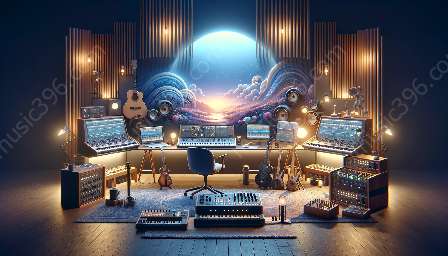MIDI controllers have revolutionized the way music is created, performed, and produced by challenging and redefining traditional notions of musical instruments and performance. This topic cluster will explore the evolution and impact of MIDI technology on the world of music, how MIDI controllers have transformed the way musicians interact with instruments, and the implications for the future of musical expression.
The Evolution of MIDI Controllers
In order to appreciate how MIDI controllers have challenged and redefined traditional notions of musical instruments and performance, it is essential to understand the evolution of MIDI technology. The Musical Instrument Digital Interface, or MIDI, became an industry standard in 1983 and forever changed the landscape of music production.
MIDI controllers are unique in that they do not produce sound on their own. Instead, they act as a bridge between a musician and a computer or sound module, allowing for the manipulation and control of digital instruments and effects. The use of MIDI controllers has become widespread in electronic music, DJ performances, and studio production, providing an unprecedented level of flexibility and control over sound creation and manipulation.
Redefining Musical Instruments
MIDI controllers challenge traditional notions of musical instruments by blurring the lines between physical and digital music-making. Unlike traditional instruments, which have a fixed physical form and sound, MIDI controllers can be customized and reconfigured to suit the needs and preferences of individual musicians.
By allowing users to assign various parameters and functions to different controls, MIDI controllers empower musicians to shape and manipulate sound in ways that were previously impossible with traditional instruments. This level of customization and flexibility has opened up new possibilities for musical expression and performance, transcending the limitations of acoustic instruments.
Enhancing Performance Capabilities
One of the most significant ways MIDI controllers challenge and redefine traditional notions of musical performance is through their ability to enhance a musician's performance capabilities. The integration of MIDI technology has transformed live performances by enabling artists to trigger samples, manipulate effects, and control instruments in real-time.
With MIDI controllers, musicians no longer have to be limited by the physical constraints of traditional instruments. Instead, they can harness the power of digital technology to expand their creative horizons and deliver dynamic and engaging live performances. This newfound control and versatility have redefined what it means to perform music in a live setting, blurring the boundaries between traditional and electronic music.
The Future of Musical Expression
MIDI controllers have undoubtedly had a profound impact on the world of music and continue to push the boundaries of what is possible in terms of musical expression. As technology continues to advance, MIDI controllers will likely play an increasingly influential role in shaping the future of music creation and performance.
The accessibility and versatility of MIDI controllers have democratized music production, allowing aspiring musicians and producers to explore new sonic territories and redefine the parameters of musical expression. With the ongoing development of innovative MIDI controller designs, the future promises even greater opportunities for artists to push the boundaries of traditional notions of musical instruments and performance.


